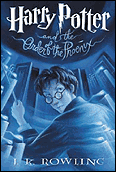Harry Potter Banned?

Why do some parents want to ban the world's favorite wizard?
by Shmuel Ross
 Related Links |
Ever since becoming popular, the Harry Potter series has been among the most frequently challenged books, as measured by the American Library Association. While the series has been welcomed by many parents and teachers for getting children interested in reading, not to mention being a good story, others feel that the series presents dangerous ideas and attitudes that are bad for readers. In some parts of the United States and United Kingdom, the Potter books have been banned from being read in school, taken out of libraries, and even burned in public.
The most prominent objections to Harry Potter fall into three categories: they promote witchcraft; they set bad examples; and they're too dark. Let's take a look at each of those.
The Trouble with Magic
One school to ban Harry Potter was St. Mary's Island Church of England school in Chatham, Kent. Head teacher Carol Rockwood explained that "The Bible is very clear and consistent in its teachings that wizards, devils and demons exist and are very real, powerful and dangerous and God's people are told to have nothing to do with them." She added that "I believe it is confusing to children when something wicked is being made to look fun."
Rockwood is not alone. Her opinion is shared by others who believe that real witchcraft exists, and that all witches are evil. They fear that any books which have good witches or good magic—like the Harry Potter series—will lead people not to take the threat of real witchcraft seriously, and possibly lead them to take the Bible's teachings in general more lightly. They might even lead readers to become witches themselves.
Others disagree. Some point out that Harry Potter is a fantasy, not a true story, and claim that even children know the difference between the two. Whether or not there is such a thing as evil magic in real life, it has nothing at all to do with the made-up spells and potions found in the books. As an editorial in Christian Century put it, "...critics are right in thinking that fantasy writing is powerful and needs to be taken seriously. But we strongly doubt that it fosters an attachment to evil powers. Harry's world, in any case, is a moral one."
Setting a Bad Example
Some people find the Harry Potter books to be inappropriate reading because of the way Harry and his friends behave. Some note that Harry "lies, breaks rules, and disobeys authority figures, including the professors at Hogwarts," and that he ends up being rewarded and praised for his actions. They feel that heroes should be entirely good people who do as they're told and respect others.
Others feel that Harry's rule infractions are part of a long tradition in storytelling. A bit of rule-bending is necessary to get to a story outside of the ordinary, they say, but children can understand that behavior that makes a good story is different from behavior that's good in general. They also point out that Harry's rule-breaking does not go without any punishment. And some note, as Mike Hertenstein does in his review of the first Potter film, that "much of Harry's rule-breaking... involves the principle of disobeying a lower law to keep a higher one—not to say he's Rosa Parks, but who could criticize Harry's violation of the no-fly rule to broom his way over a bully and stand up for his friends?"
Finally, some believe that even heroes aren't perfect; Harry and his friends may do some things wrong, but they are positive role models on the whole, working selflessly for all that's good and noble.
Scary Stuff
Some people think that the Harry Potter books—especially the later ones—are too dark and scary for children to handle. The series begins as Harry is orphaned, and he soon learns his parents were violently killed. There are intense battles. Good people die, suddenly and horribly. This, some say, is the stuff of nightmares, not something to be handed to kids as entertainment.
Others feel that children can handle more than they're sometimes given credit for. Some even feel that reading scary stories is one safe way kids learn how to deal with the reality of death. At any rate, they say, there is a long tradition of gruesome ghost stories, scary fairy tales, and sad novels for children. Such diverse classics as The Red Badge of Courage, Little Women, Charlotte's Web, and The Hobbit all include the deaths of major characters. Harry Potter fits right in.
Banned Books Week
The American Library Association (ALA) celebrates "Banned Books Week" in the final week of each September, to call attention to the fact that people try to ban many books—including Harry Potter—every year. Their position is not that all books are good, or even that all books are suitable for children. However, the ALA feels that each family ought to be able to decide this for itself, rather than having the decision taken out of their hands by others.
